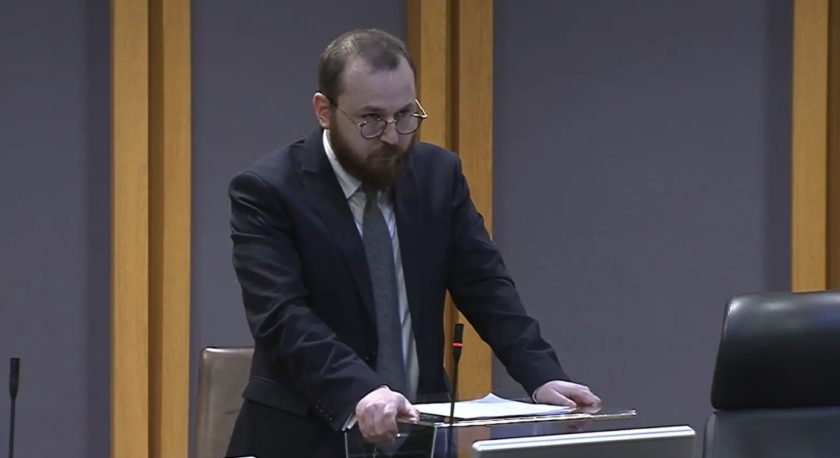Wales urged to protect at-risk citizens as prepayment meter ban ends

Wales must safeguard vulnerable people at risk of fuel poverty after a ban on energy companies forcibly fitting prepayment meters came to an end, a committee warned.
Jack Sargeant led a debate about a petitions committee inquiry into the prepayment meter scandal and the Welsh Government’s response to the report’s recommendations
The Labour backbencher, who represents Alyn and Deeside, welcomed Ofgem’s new mandatory code of conduct but suggested protections could have been much stronger.
The committee chair warned that seven energy suppliers have already been given the green light to restart involuntary installation of prepayment meters in Wales.
Mr Sargeant said: “What is vital now is that the energy regulator Ofgem continues to monitor the code of practice and, more importantly, makes changes if things are not working.”
‘Fundamentally wrong’
Joel James welcomed UK Government scrapping prepayment meter premiums as a big step forward in promoting a fairer and more just system.
He said prepayment meters can be an effective way of helping households manage budgets but customers are traditionally charged a far higher tariff than direct debits.
The Tory MS, who represents South Wales Central, acknowledged it was fundamentally wrong for energy companies to involuntarily install meters for vulnerable customers.
Mr James called for efforts to eliminate the stigma of seeking support, warning it takes families facing financial difficulty an average of two years to come forward.
He also advocated a system to override prepayment meters in times of vulnerability to maintain the supply of electricity and gas to households with children or older people.
‘National scandal’
Plaid Cymru’s Peredur Owen Griffiths said people should not be forced into making a decision between heating and eating in 21st-century Wales.
He warned: “Unfortunately, that is what is happening in many, perhaps even a majority, of the communities we represent in the Senedd. That is an injustice and a national scandal.”
He told the chamber the committee was alarmed that a prohibition on prepayment meters only applies to those 75 or over and families with children under two.
Mr Owen Griffiths, who represents South Wales East, argued households should be receiving more support from the Welsh and UK Governments.
He called for action to alleviate high levels of energy-related debt.
‘Bullying’
Rhianon Passmore, a Labour backbencher, criticised British Gas for routinely sending debt collectors to break into customers’ homes and force-fit prepayment meters.
The Islwyn MS said an investigation by The Times found British Gas agents were sent to force-fit a metre at the home of a young mother with a four-week-old baby.
Ms Passmore told the chamber: “Her bills had risen sevenfold during the cost-of-living crisis – what a symbolic and bullying institutional act.”
She said only 1,500 people have been awarded compensation despite more than 150,000 installations being assessed by energy companies.
Calling for people to be prioritised over profit, she said British Gas owner Centrica’s adjusted profits soared to £3bn – the highest in the Ftse 100 company’s history.
‘Shameful’
Sioned Williams, who represents South Wales West, said fuel poverty is completely unsustainable and shameful in a country among the wealthiest in the world.
She warned that fuel poverty has increased in Wales and remains at a critically high level, including 98% of low-income households.
The Plaid Cymru shadow social justice secretary said debt on energy bills has more than doubled over the past three years, according to Ofgem.
She said: “The picture in Wales is bleaker, given the south and north are in the top three most expensive regions for energy, and given fixed charges are at their highest levels ever.”
Ms Williams called for urgent action to ensure the Welsh Government meets its target of reducing the number of households in fuel poverty to 5% over the next decade.
‘Unacceptable’
Jane Dodds, the Lib Dems’ leader in Wales, warned that force fitting prepayment meters without safeguards flagrantly violates consumer protections.
She said a third of Welsh prepayment meter users faced disconnection last year due to high costs, with 13% going more than a week without energy, according to Citizens Advice.
The Mid and West Wales MS said relying on suppliers’ self-governance is unacceptable, as is allowing debt collectors to conduct initial vulnerability assessments..
Calling on the Welsh Government to urgently accelerate action to tackle fuel poverty, she raised concerns about the Warm Homes programme being delayed by a year.
“We have to do more and faster,” she said during the debate on May 1.
‘Deeply frustrating’
Lesley Griffiths said Jane Hutt, her predecessor as social justice secretary, raised concerns about the prepayment system with suppliers before the scandal broke in early 2023.
She welcomed Ofgem heeding Welsh ministers’ calls to make the initially voluntary code of practice on prepayment meters mandatory.
Ms Griffiths reiterated the Welsh Government’s calls for a social tariff, which would provide a discount for the most vulnerable customers.
She criticised the UK Government for failing to deliver a 2022 commitment on consumer protection reforms, saying: “This is deeply frustrating.”
Ms Griffiths urged energy suppliers to only use accredited debt collection agents to strengthen the protection available to prepayment customers.
Spotted something? Got a story? Send a Facebook Message | A direct message on Twitter | Email: [email protected]Latest News









